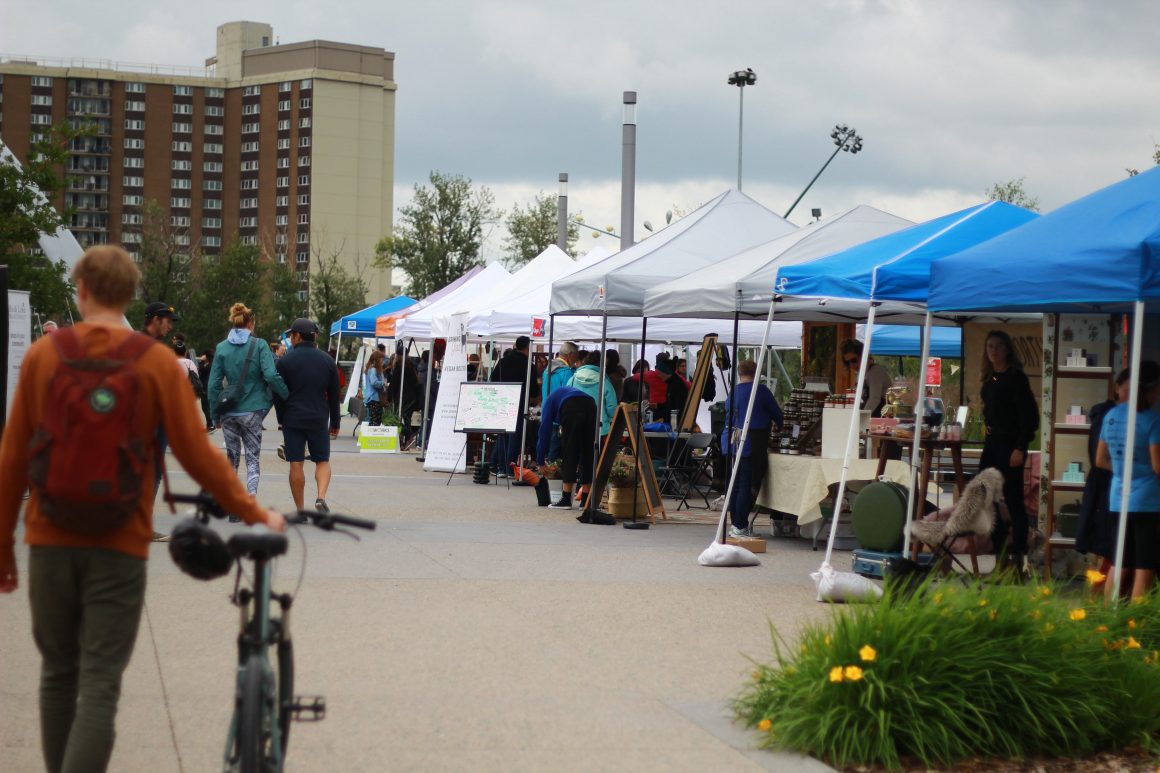
Zero Waste Festival shows social media is just the beginning of environmental activism
By Samantha Rigor, August 1 2019—
Calgary’s first-ever Zero Waste Festival, put on by Plastic-Free YYC, highlighted the ups and downs of social media’s role in environmental issues.
Held on July 20 in East Village, the festival hosted a variety of booths that were well-visited. According to community relations managerTara Brady, the turnout for the festival saw a steady stream of traffic. The bicycle-powered main stage had scheduled presentations on various topics, the most interesting to me being a panel discussion made up of people experienced in sustainable fashion.
One of the four panelists, Ally Tran, is an ethical fashion business owner and blogger. She was asked what she thought of the significance of social media, and she began by crediting it for creating awareness, especially in those just being introduced to the issue. She said that social media is the most accessible platform for smaller organizations to spread the word about their causes.
As we currently observe with the sans-straw movement social media has prompted mindfulness in people — the emotion-invoking video of a sea turtle with plastic stuck in its nose was shared time and time again. When asked if she thought social media left anything to be desired in promoting issues, Tran noted the tendency for people on social media to feel like they’re accomplishing something, even if they only share a video or re-tweet a thought. She used the term “slacktivism” to describe the assumption that discussion online is enough to feel like something is being done about a particular issue. Awareness is one thing, but action is another.
“We need to be willing to step away from the spotlight and do real work that’s going to make a tangible impact,” said Tran during the panel.
The truth is, with social media being a tool to reach a vast audience, some things get lost in translation. Trending topics passing by at the speed of light often won’t allow for the bigger picture to be seen. Take the turtles and the straws for example. While it’s important to learn about the harm plastics do to our oceans and provoke action on reducing their use, that’s only a fraction of the problem. The wider picture involves plastic production, consumption, lack of decomposition and what it all means for the future of the environment.
Still, small action is better than no action.
As for any advice she had for those new to sustainability, Tran recommended surrounding yourself with like-minded people and being open to changing your mindset in order to really understand the issues with depth and ethical interconnectedness.
Brady also acknowledged how daunting it may seem at first. She said that one of the things she wants people to take away from the Zero Waste Festival is that change doesn’t have to be a massive step — anyone can start small by using reusable mugs, bags, or cutlery.
When asked about the role of social media in Plastic-Free YYC’s goals, Brady explained that the group uses Facebook, Twitter and Instagram to share their cause and over time, interest in their smaller events has grown. She says that there has been a noticeable shift in Calgarian’s ideas. This year saw hopefully the first of many zero waste festivals and the organization looks forward to the continuing success of their initiative, bolstered by social media, but hopefully actively engaging people to make real-life change.
This article is part of our opinions section and does not necessarily reflect the views of the Gauntlet editorial board.
